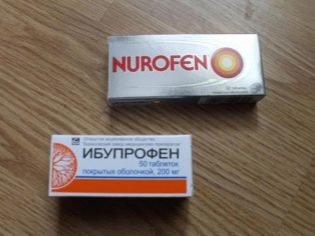"Analgin" during pregnancy: instructions for use
During pregnancy, pain, colds, various inflammatory processes and other problems that Analgin is able to cope with are possible. But to rush to take this medicine if a woman is expecting a baby is not worth it. This tool is often in the home first-aid kit, sold over the counter without a prescription, and has a pronounced effect. but there are some limitations for taking Analgin.
Drug features
"Analgin" is produced by many pharmaceutical companies in three dosage forms, the main component of each of which is metamizole sodium.
- Rectal Candlescontaining 100 or 250 mg of active compound. They have a white or creamy yellow color and a bullet-shaped form, and there are 10 suppositories in one package.
- Tablets with a dosage of 500 mg. Usually they are round and white, sold either in jars or in blisters from 10 pieces per pack.
- A solution with a concentration of the active substance of 25% or 50%. It is used for intramuscular injection or injected into a vein. Such "Analgin" is a clear liquid, poured into 1 or 2 ml in ampoules. In one pack sell 5-10 ampoules.
As you might guess from the name, “Analgin” has an analgesic effect. This non-narcotic agent affects the center of pain, effectively eliminating weak or moderately expressed pain. By its mechanism of action, such a drug belongs to the group of nonsteroidal anti-inflammatory drugs, as it is able to inhibit the formation of prostaglandins.
This causes the presence of "Analgin" and antipyretic effect, but the inflammatory process of such a drug affects less than its counterparts.
Is it used in pregnant women?
According to most doctors, taking "Analgin" while carrying a child is dangerous for both mother and fetus, so you should not use this drug. Studies have confirmed the high risk of complications and developmental disorders, and many countries have banned Analgin for a long time not only for pregnant women, but also for any other patients. Nevertheless, many doctors believe that a single dose of this drug, taking into account contraindications, will not entail any disastrous consequences. In addition, at different times, the risks of using "Analgin" will be different.
1 term
According to the instructions for Analgin, any form of such a drug in the first 12 weeks of carrying a baby is contraindicated. At this time, all the organs of the child are formed and its active growth occurs, therefore, even with a slight negative impact, irreversible changes are possible. In particular, when taking “Analgin” in the first trimester it happens:
- the appearance of malformations;
- abortion;
- uterine bleeding;
- malignancy in the fetus.
For this reason, it is impossible to drink pills or use candles in the early period.
To reduce the likelihood of such problems, experts advise not to take "Analgin" even during planning - at least 3 months before conception.
2 term
This period of pregnancy is called the safest by doctors, since external factors affect the fetus to a lesser extent than up to 12 weeks. Therefore, it is possible to take "Analgin" in the second trimester, but the use of such a drug should be once and only after consulting a specialist.
Taking the drug is acceptable in the case when there are no other drugs on hand or they have had a weak effect. In this case, the dosage is better to check with the doctor, because it should be minimal. As for the prolonged use of “Analgin”, then even in the 2nd trimester it represents a danger to the cardiovascular system of the child and other organs of the fetus.
3 term
At the beginning of this period, taking "Analgin" is admissible, but it is governed by the same restrictions as for the second trimester. However, for a period of 34-40 weeks, the use of such a medicine is prohibited. First, under the action of metamizole, the level of prostaglandins will decrease, which may worsen labor activity or become an obstacle to the timely onset of labor. Secondly, the active substance "Analgin" adversely affects blood clotting, which increases the risk of bleeding during delivery and in the postpartum period. In addition, one of the side effects of the drug is a decrease in the number of leukocytes, which will increase the risk of infection for a female body weakened by the end of pregnancy.
Are the injections used?
The most common form of “Analgin” used by adults is tablets, but this medicine is also represented by injections. The active substance from the sterile solution is absorbed much faster and gives a pronounced therapeutic effect, so the "Analgin" injections are in demand for fever and severe pain syndrome, for example, burns, radiculitis or injury.
However, for pregnant women this form of medication is highly undesirable, because with its high efficiency, the risk of side effects is also quite large. Such injections are used only in exceptional cases and only under the supervision of a specialist.
Contraindications
When applying “Analgin” for pain, one must remember that this is a symptomatic drug, that is, it affects only the sensations themselves, but does not affect the cause that provoked such a symptom. As with any other medication, there are some contraindications for using Analgin, which are especially important to consider for women in the situation. Such medication is prohibited when:
- hypersensitivity;
- renal failure;
- high risk of allergic reaction;
- liver disease;
- bronchial asthma;
- no glucose-6-phosphate dehydrogenase;
- oppression blood;
- low blood pressure.
In addition, Analgin is incompatible with many other drugs and can act toxicly if this recommendation is violated. Therefore, if the expectant mother is already taking any medication, then drink Analgin without prior specification of compatibility is unacceptable. It is also important not to violate the dosage, which the doctor prescribed, as it threatens a sharp decrease in temperature, tachycardia, shortness of breath, weakness, vomiting and other symptoms that can be dangerous for the baby in the abdomen, and for the woman herself.
Side effect
It is because of the frequent side effects that provokes "Analgin", such a medicine is not recommended for children or adult patients. This medication is often the cause of allergies up to anaphylactic shock. In addition, it has a bad effect on the formation of blood cells, which in some people can provoke inflammatory and infectious complications. Sometimes taking "Analgin" damages the urinary system and affects the liver, causing nephritis or hepatitis.
What to replace during pregnancy?
If a woman expects a baby, the best way out is to refuse any medication, but compliance with such a recommendation is often impossible, so in order not to take Analgin, you should be aware of a safer replacement of such a drug. In case of heat and pain, the expectant mother can use Efferalgan, Paracetamol or Panadol. All of these medicines contain paracetamol and can be used on any period of pregnancy.
But since they also have contraindications, and it is recommended to select the dosage individually, the reception of these funds should be carried out after a doctor's prescription.
Another option for replacing "Analgin" with severe pain or fever can be called "Ibuprofen", "Mig 400", "NurofenOr another drug based on ibuprofen. Such drugs also have anti-inflammatory effects, so their effectiveness will be higher if the pain arose due to inflammation. However, they are prohibited in the third trimester, so in the last months of taking any medication with ibuprofen should be avoided.
See if the following video is for pregnant analgin.





















